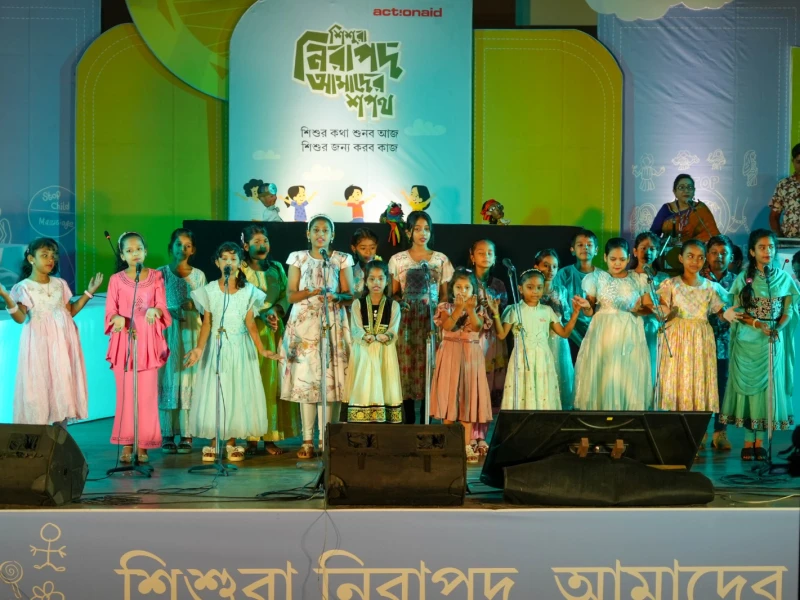Ahead of the upcoming national elections, more than 200 children from across Bangladesh have presented a six-point manifesto, calling on the Government, political parties, and all relevant stakeholders to place child protection and rights at the heart of their policies, programmes, and commitments.
The manifesto, unveiled Tuesday at a special event organised by ActionAid Bangladesh at the Bangladesh Shishu Academy as part of Children’s Rights Week 2025, highlights six key priorities — quality education, accessible healthcare, inclusion of children’s voices in decision-making, cyber safety, climate justice, and a safe environment for all children. It also urges stronger enforcement of laws to end child marriage, child labour, and violence against children.
Held under the theme “Empowering Children, Ending Child Marriage – Ensuring Safe Childhoods in the Digital World,” the event amplified the voices of children from marginalised communities and called for collective action to uphold their rights and ensure their well-being.
A high-level panel discussion moderated by Farah Kabir, Country Director of ActionAid Bangladesh, brought together senior government officials from the Ministry of Women and Children Affairs, academics, child rights experts, and representatives from development organisations.
Speakers underscored that ensuring children’s holistic protection and development is a shared responsibility of the State, society, and individuals. They urged policymakers to act urgently to create a safer, more inclusive future for children in both physical and digital spaces.
During the session, children read out their manifesto and shared their aspirations for a safer and fairer society. Tamanna, a child representative, said, “We want education on sexual and reproductive health and rights to be made compulsory in every school. The Government must ensure consistent monitoring and enforcement of laws to end child marriage and promote cyber safety. Development organisations should raise awareness and train children in life skills and leadership.”
Farah Kabir noted that incorporating children’s perspectives in policymaking is essential for meaningful reform. “Policies concerning children directly affect their lives. Listening to them is not only their right but also the foundation of effective governance. In the digital era, ensuring both safety and opportunity for children must be a collective goal,” she said.
Additional Secretary of the Ministry of Women and Children Affairs, Shabnam Mustari, stressed stronger collaboration among the Government, civil society, and development partners. “Creating an effective cyber unit to prevent online harassment and including digital literacy in the curriculum are vital to building a safe and just society for children,” she said.
Bangladesh Shishu Academy Director General (Additional Secretary) Dilara Begum said the academy is working to foster creativity and positive parenting. “Creating an environment where children can confidently express their opinions at the policy level is a national responsibility,” she noted.
UNICEF Bangladesh Chief of Child Protection Natalie McCauley said, “Children must be recognised as future leaders, and their voices must not be ignored. Establishing a dedicated division for children within the Ministry of Women and Children Affairs could help address systemic gaps.”
Bangladesh Telecommunication Regulatory Commission (BTRC) Chairman Mohammad Emdad-ul-Bari highlighted the importance of digital literacy among parents. “Ensuring safe online platforms for children requires digitally skilled and responsible guardians. BTRC is working to establish a stronger legal framework to hold social media platforms accountable,” he said.
Dhaka Metropolitan Police Additional Deputy Commissioner Md. Elius Ziku emphasised policy reforms to combat online harassment. “Beyond law enforcement, we need updated legislation aligned with new technologies and greater cyber awareness among parents,” he said.
National Human Rights Commission (NHRC) Honorary Member Dr. Tania Haque called child marriage a serious human rights violation. “It has unfortunately gained social acceptance. We must strengthen legal enforcement and promote gender-neutral parenting to protect children from discrimination,” she said.
The event concluded with cultural performances and a symbolic “Children’s Parliament Session,” where children from different regions directly presented their policy demands to government officials and NGO representatives. Around 80 child journalists from across Bangladesh also participated virtually, echoing the collective call for a safer, more inclusive future for all children.


 Prev Post :
Prev Post :
